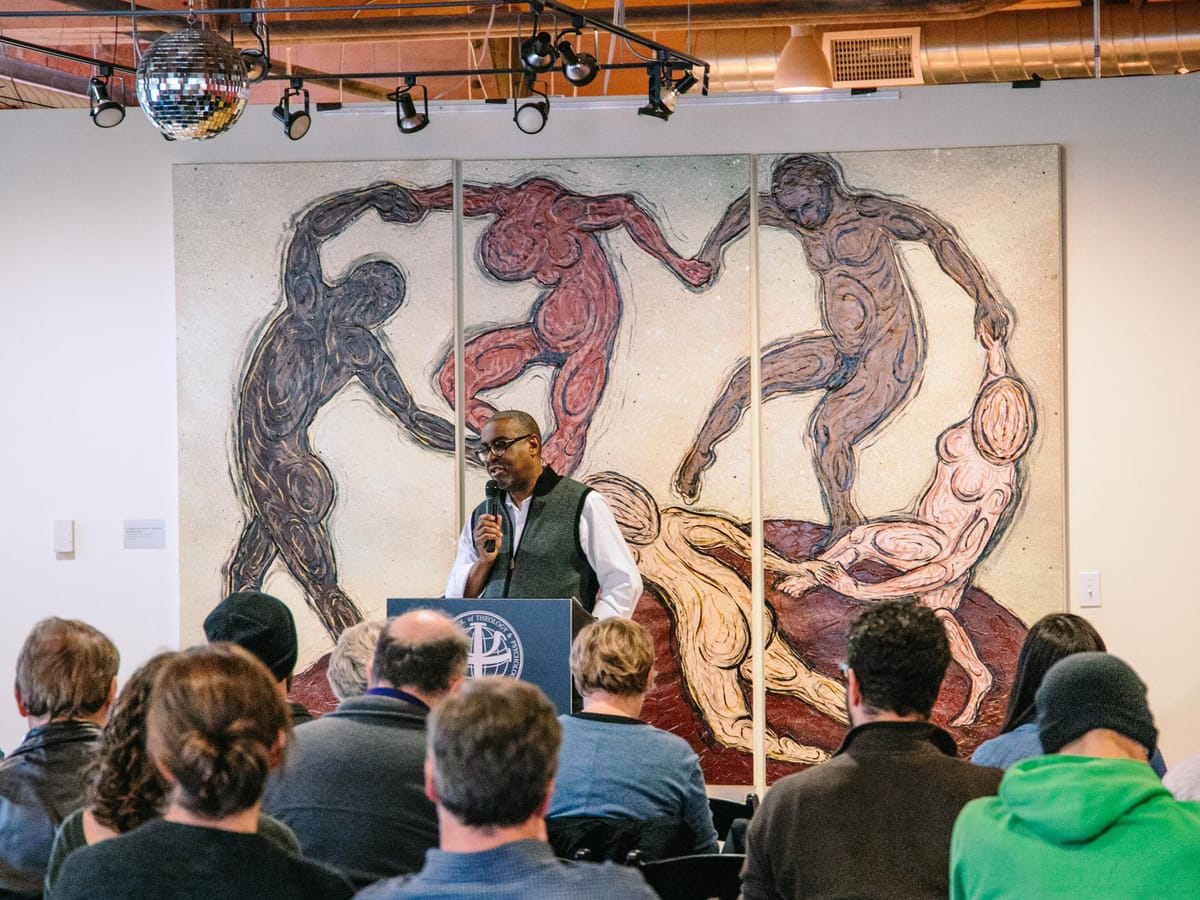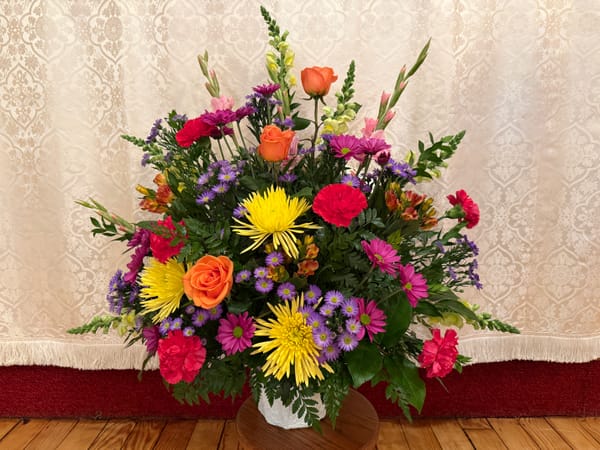An Invitation to World-Changing Relationships
We are invited as followers of Christ to change the world, to bring forth the kingdom of God in our daily lives. And we can start doing it today.

June 15, 2025 - Trinity Sunday
My friends, I speak to you today in the name of one God, Father, Son, and Holy Spirit. Amen. Please be seated.
Good morning, Epiphany. I think it’s a good morning, I am wearing the fancy gold vestments again for the feast day of Trinity Sunday, so that’s nice. As I mentioned in our newsletter this week, this is the last of the Episcopal Church’s seven principal feast days during our liturgical year, on par with Easter, Christmas, All Saints, Pentecost... this is not one everyone is familiar with, there’s no Trinity Bunny or Trinity Santa today. I thought about trying to incorporate the Legend of Zelda’s Tri-Force, but I’m not sure that reference connects well across generational lines. Any other mascots would probably commit some light heresy if they tried to help explain the Trinity, maybe that’s why we don’t have one. So, yeah, happy Trinity Sunday. Celebrate as you usually do? I guess?
Celebrating anything this morning could be tough for many of us though. A few of you came to me this week and thanked me for last Sunday’s sermon, one where I mentioned that I could hardly watch the news last week without my anxiety level rising. I mentioned the wars in Ukraine and in Gaza, the childish Twitter battle between a billionaire and the president, and the alarming response to the protests in Los Angeles. It was a lot. After the news barrage of this week, however, that all feels like it happened months ago. I likely don’t need to tell you, so I promise not to do a complete news recap again this morning, but literally every day this week held new and increasingly troubling horrors, worse than anything from the week before. The budding Iran-Israel conflict was the news story that led me into my worst spiral thus far this year... I found myself driving Lily to Culver’s late Thursday night for comfort ice cream and trying to explain to our twelve-year-old the history of the world, the use of nuclear weapons in World War II, the devastation war can bring, how the U.S. might get involved, and what a nuclear holocaust might look like. It ended with her taking care of me, with reassurance that all would be okay. We’ll see.
To go along with that opening volley of anxiety and concern, today is Father’s Day, a day that admittedly is a positive one at our house. My girls always take care of me well and I try to do something for my dad, even though it’s in the middle of our birthday season... but this is not a day that is joyous for everyone, including several of us here at Epiphany. Many people in our world have or did have strained relationship with their fathers, and celebration is not really in the cards for you today. I heard your stories this week, and the church laments with you. For some moms, the father of their children is not one they especially want to celebrate, making conversations difficult on this day in particular. For some dads, they may feel like a failure as a father themselves, relationships may be broken beyond repair. Memories of failures can make today painful. Many cannot think of God as Father because their dads were far from perfect, were not at all comforting.
And, the relationships between fathers and their children are not the only relationships that are broken these days. In my most memorable conversation from this week, one I’ll be thinking about for a long time, we mourned the state of all relationships in a world dominated by technology. Each one of us, or at least the vast majority of us, now spends more time in front of screens than people ever have in human history. Our screen time keeps increasing, increasing to the point that we begin to subconsciously prefer our phones, our computers, our video games, our iPads, our TVs to real-life interaction. We get our dopamine fix by the next video, the next laugh, the next gossip. We are fed that steady diet of world-ending news, and we feel like we would be bad citizens if we did not consume more than ever before. We as a society have let these screens shape us so much that, too often, we can no longer have real dialogue with each other; we have lost the capability to listen and to think and to be changed. We merely repeat what we have heard on those screens, waiting for each other to stop speaking so we can have our turn. Our conversations have become a series of social media posts brought to life; the tools have shaped the hands that use them. If you think you are exempt from this because you don’t use some new tech that others use, you’re likely wrong, and I urge you to consider this in your own life, in your relationships. Relationships in 2025 are broken in every family. These summer family reunions that may have once been looked forward to are now often times of tension, judgment, disappointment, even paradoxically of increased isolation.
Deep breaths. I know this is an especially bleak way to begin a sermon, with the horrors of the news, with reminders of fathers who failed, with reminders of broken relationships in a difficult world. It’s especially bleak on day that is supposed to be a celebration.
So, what’s the good news, preacher? What’s the gospel? How does any of that tie in with the lectionary readings, with our gathering here in worship this morning? Well, let’s see.
Two of our readings today were surprisingly short, five verses from Paul’s letter to the Romans and four verses from the Gospel according to John. Our reading from Proverbs, from ancient Jewish scripture, talks about the Holy Spirit, naming her “wisdom,” giving her a voice that says she has been there since the beginning, rejoicing before God the Father always, rejoicing in the inhabited world and delighting in the human race. In Romans, we have the comforting and familiar passage that suffering produces endurance, character, and ultimately hope, a reminder we might want to hold on to today, and it's alongside a triune description of God: peace and grace through Jesus, God’s love poured into our hearts by the Spirit. And then in John, Jesus himself tells the disciples that the Spirit of truth will come to guide us; we talked about this a bit last week at Pentecost.
So today, on Trinity Sunday, we are asked to consider the three persons of God alongside centuries of Christian tradition. Any description of God will necessarily fail; it will be inadequate. Paul writes to the Corinthians that for now we see only a reflection, as in a mirror – we know God only in part – but some day we will see fully, face to face. Most of the analogies and metaphors you will hear preached on Trinity Sunday commit some form of heresy, whether it be the ice cube/water/steam metaphor, the sun/light/heat metaphor, or the three-leaf-clover metaphor... they all end up trying to explain something that cannot be explained. We are invited, instead, to recognize the Trinity as a mystery, understood only through faith, that these three persons are equal in glory, co-equal in majesty. We have the Creeds to guide us, especially the one we’ll say here in a bit, where praying this on a regular basis helps us believe, though not necessarily fully understand.
As a quick note, the Nicene Creed has language that we’ve been stumbling over for months, with the Spirit “proceeding from the Father and the Son.” The Church divided over this phrase, divided over their understanding of the Trinity, in the Great Schism of the 11th century, creating the Eastern Orthodox and the Roman Catholic churches as we know them today. The Anglican Communion and the Episcopal Church decided to lean into the Eastern church’s understanding back in the 1990’s, hence the confusion for us each week. I put it in parenthesis for us this morning; say it if you like. It matters, but only a little.
Because it’s all a mystery. The Trinity is a mystery, and I will try not to be heretical this morning in talking about it. What I think I can say though, is that the Trinity is about relationship. A popular image of the Trinity is that of a dance between three people, usually in a circle, the perichoresis of each making room for each other in a dynamic, mutual relationship. An art piece of this dance hung in the main lobby of my first seminary, in Seattle. This dance of God involves a give and a take, it fundamentally requires an ability not only to lead, but also to follow, to respond to the actions of the other, in flowing community.
Friends, this is the good news for us today. We are invited into this life, into this dance of love that we take as our image of the triune God. If God is dancing, loving, flowing from person to person, from Father to Son to Spirit, and we believe in the church that God is, then that is the image of God in which we are also created. Introverts and extroverts alike have an inherent longing for relationship; we long to be listened to and to be heard and to be truly known by the other whether that be our friends, our spouses, our parents, we long to be known. And we ourselves have the ability to listen and to hear others too, though many of us seem to have lost that ability of late. It is a gift that we can give each other, to listen to their stories, to know who they are, to care enough that we can actually ask follow-up questions.
Many here at Epiphany have told me about the practice of knees-to-knees, where you sit in a group of three and ask each other good and important questions, practicing and embodying this trinitarian relationship. We did knees-to-knees at St. Martin’s in Charlotte too, and we plan to do it again here later this summer. It is simply one way to remind us, to build us for loving and caring relationships here as the church.
Because this world is not built for loving and caring relationships. We are urged to stay plugged in to our feeds of strong, one-sided opinions. We are told that our opinions and our preferences and our needs are the only ones that matter. Friends, please do not fall for that story, that you are the center of the universe, that your personal comfort and security is of utmost importance and that it is constantly under threat from those around you. Quite simply, that leads to hate. Instead, on this Trinity Sunday, reach out in the dance of love. Listen, ask good questions, recognize the other has a story to tell. By your example, maybe they too will begin to listen and ask good questions.
We are invited as the church, as followers of Christ, to change the world, to bring forth the kingdom of God here and now in our daily lives. We can actually start doing that now, today, in each interaction, by showing love through listening, through grace for the other, through giving and receiving and mutual connection as modeled in the Trinity of Father, Son, and Spirit. It is that sort of love that will change our relationships, it will change our families, and it will change the world. And that is something that is indeed actually worth celebrating.
Amen.




